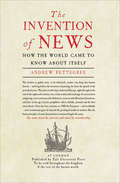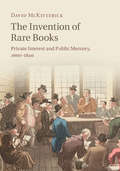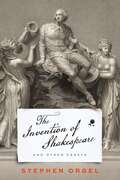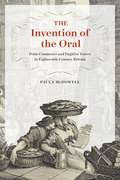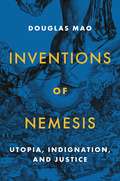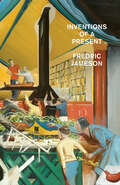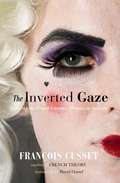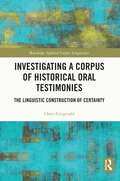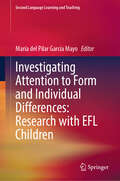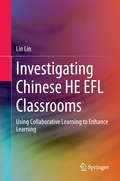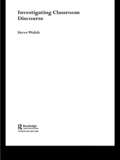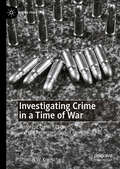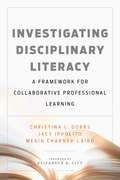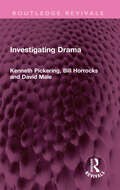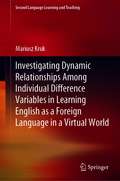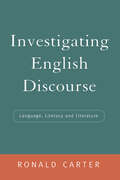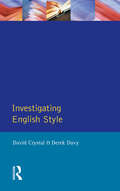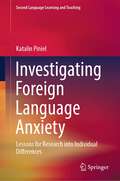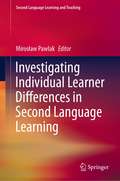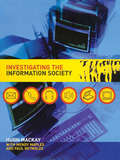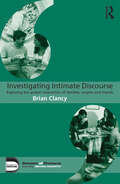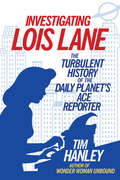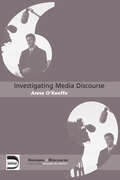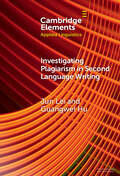- Table View
- List View
The Invention of News: How the World Came to Know About Itself
by Andrew Pettegree&“A fascinating account of the gathering and dissemination of news from the end of the Middle Ages to the French Revolution&” and the rise of the newspaper (Glenn Altschuler, The Huffington Post). Long before the invention of printing, let alone the daily newspaper, people wanted to stay informed. In the pre-industrial era, news was mostly shared through gossip, sermons, and proclamations. The age of print brought pamphlets, ballads, and the first news-sheets. In this groundbreaking history, renowned historian Andrew Pettegree tracks the evolution of news in ten countries over the course of four centuries, examining the impact of news media on contemporary events and the lives of an ever-more-informed public. The Invention of News sheds light on who controlled the news and who reported it; the use of news as a tool of political protest and religious reform; issues of privacy and titillation; the persistent need for news to be current and for journalists to be trustworthy; and people&’s changing sense of themselves and their communities as they experienced newly opened windows on the world. &“This expansive view of news and how it reached people will be fascinating to readers interested in communication and cultural history.&” —Library Journal (starred review)
The Invention of Rare Books: Private Interest and Public Memory, 1600–1840
by David McKitterickWhen does a book that is merely old become a rarity and an object of desire? David McKitterick examines, for the first time, the development of the idea of rare books, and why they matter. Studying examples from across Europe, he explores how this idea took shape in the sixteenth and seventeenth centuries, and how collectors, the book trade and libraries gradually came together to identify canons that often remain the same today. In a world that many people found to be over-supplied with books, the invention of rare books was a process of selection. As books are one of the principal means of memory, this process also created particular kinds of remembering. Taking a European perspective, McKitterick looks at these interests as they developed from being matters of largely private concern and curiosity, to the larger public and national responsibilities of the first half of the nineteenth century.
The Invention of Shakespeare, and Other Essays
by Stephen OrgelIn his own time, Shakespeare was not a monument, but a man of the theater whose plays were less finished artifacts than works in process. In contrast to a book, a thing we have come to think of as final and achieved, a play is a work for performance, with each performance based only in part on a text we call a script. That script may well have had imperfections that the actors may or may not have noticed as they turned it into a performance. There were multiple versions of the scripts and never a "final" one. Every revival of a play—indeed, every subsequent performance—was and always will be different. Nevertheless, when we study Shakespeare, we are likely to come to him via printed texts that are scripts masquerading as books, and the impulse is to turn them into finished artifacts worthy of their author's dignity.In The Invention of Shakespeare, and Other Essays Stephen Orgel brings together twelve essays that consider the complex nature of Shakespearean texts, which often include errors or confusions, and the editorial and interpretive strategies for dealing with them in commentary or performance. "There is always some underlying claim that we are getting back to 'what Shakespeare actually wrote,'" Orgel writes, "but obviously that is not true: we clarify, we modernize, we undo muddles, we correct or explain (or explain away) errors, all in the interests of getting a clear, readable, unproblematic text. In short, we produce the text that we want him to, or think he must have written. But one thing we really do know about Shakespeare's original text is that it was hard to read."
The Invention of the Oral: Print Commerce and Fugitive Voices in Eighteenth-Century Britain
by Paula McDowellJust as today’s embrace of the digital has sparked interest in the history of print culture, so in eighteenth-century Britain the dramatic proliferation of print gave rise to urgent efforts to historicize different media forms and to understand their unique powers. And so it was, Paula McDowell argues, that our modern concepts of oral culture and print culture began to crystallize, and authors and intellectuals drew on older theological notion of oral tradition to forge the modern secular notion of oral tradition that we know today. Drawing on an impressive array of sources including travel narratives, elocution manuals, theological writings, ballad collections, and legal records, McDowell re-creates a world in which everyone from fishwives to philosophers, clergymen to street hucksters, competed for space and audiences in taverns, marketplaces, and the street. She argues that the earliest positive efforts to theorize "oral tradition," and to depict popular oral culture as a culture (rather than a lack of culture), were prompted less by any protodemocratic impulse than by a profound discomfort with new cultures of reading, writing, and even speaking shaped by print. Challenging traditional models of oral versus literate societies and key assumptions about culture’s ties to the spoken and the written word, this landmark study reorients critical conversations across eighteenth-century studies, media and communications studies, the history of the book, and beyond.
Inventions of Nemesis: Utopia, Indignation, and Justice
by Douglas MaoA wide-ranging reevaluation of utopian literature and philosophy, from Plato to Chang-Rae LeeExamining literary and philosophical writing about ideal societies from Greek antiquity to the present, Inventions of Nemesis offers a striking new take on utopia’s fundamental project.Noting that utopian imagining has often been propelled by an angry conviction that society is badly arranged, Douglas Mao argues that utopia’s essential aim has not been to secure happiness, order, or material goods, but rather to establish a condition of justice in which all have what they ought to have. He also makes the case that hostility to utopias has frequently been associated with a fear that they will transform humanity beyond recognition, doing away with the very subjects who should receive justice in a transformed world. Further, he shows how utopian writing speaks to contemporary debates about immigration, labor, and other global justice issues. Along the way, Inventions of Nemesis connects utopia to the Greek concept of nemesis, or indignation at a wrong ordering of things, and advances fresh readings of dozens of writers and thinkers—from Plato, Thomas More, Nathaniel Hawthorne, Edward Bellamy, Charlotte Perkins Gilman, and H. G. Wells to John Rawls, Robert Nozick, Fredric Jameson, Ursula Le Guin, Octavia Butler, and Chang-Rae Lee.Ambitious and timely, Inventions of Nemesis offers a vital reconsideration of what it really means to imagine an ideal society.
Inventions of A Present: The Novel in its Crisis of Globalization
by Fredric JamesonThe giant of literary theory analyses the novel: Conrad, James, Atwood, Oe, Mailer, Grass, Grossman, Garcia Marquez, Gibson, Knausgaard and moreA novel is an act, an intervention, which, most often, the naïve reader takes as a representation. The novel intervenes to modify or correct our conventional notions of a situation, and, in the best and most intense cases, to propose a wholly new idea of what constitutes an event or of the very experience of living.The most interesting contemporary novels are those which try – and sometimes succeed – in awakening our sense of a collectivity behind individual experience; opening up a relationship between the isolated subjectivity and class or community. But even if this happens (rarely!), one must go on to find traces of collective praxis hidden away within the mere awakening of a feeling of multitude.And, since it is in the sense of the nation and nationality that collectivity is most often expressed, it is urgent to disengage the possibilities of genuine action within these nationalisms.This sweeping collection of essays ranges from the elusive politicality of North American literature to the sometimes frozen narrative experiences of the eastern countries and the old Soviet Union; from East Germany to Japan, Latin America and the Nordic countries. Like any such voyage, it is an arbitrary movement across the world of historical situations which, however, seeks to dramatize their common kinship in late capitalism itself.
The Inverted Gaze
by David Homel François CussetFrançois Cusset, author of the acclaimed book French Theory, investigates the queering of the French literary canon by American writers and scholars in this thought-provoking and free-minded journey across six centuries of literary classics and sexual polemics.Cusset presents the foundations and rationale for American queer theory, the field of study established in the 1990s and promulgated by writers and scholars such as Judith Butler, Eve Kosofsky Sedgwick, and Michael Warner (in the wake of Michel Foucault), which challenges a supposed "heteronormative" ideology in our culture. He provides an overview of their reinterpretation of the French literary canon from a queer perspective, then deliberately goes further, confronting that same canon with a lively form of general suspicion-seeking gender trouble and sexual ambiguities in the most unexpected corners of French literary classics, in which macho heroes turn out to be homosocial melancholics and the most seemingly submissive housewives are great vanguards of lesbian liberation.Cusset's survey includes medieval and Renaissance literature, works from the Age of Enlightenment, nineteenth-century avant-gardists such as Charles Baudelaire and Honoré de Balzac, and twentieth-century modernists such as Marcel Proust and Jean Genet.Bold in its themes and propositions, The Inverted Gaze (a translation of the book Queer Critics) is an extraordinary work about French literature and American queer politics by one of France's biggest intellectual stars.François Cusset is a professor of American studies at the University of Paris. He is the author of numerous books including French Theory (2008).David Homel is an award-winning translator and writer who lives in Montreal, Quebec.
Investigating a Corpus of Historical Oral Testimonies: The Linguistic Construction of Certainty (Routledge Applied Corpus Linguistics)
by Chris FitzgeraldInvestigating a Corpus of Historical Oral Testimonies guides the reader through the process of sourcing a relevant oral history archive for linguistic analysis, constructing a representative corpus out of this archive and analysing this using corpus tools. Focusing on the oral history archive at the Irish Bureau of Military History, this book shows how corpus linguistics can illuminate themes worthy of investigation that may otherwise remain hidden. This is exemplified through the investigation of how certainty is constructed in this archive through a number of expressions and which serves as a template for both how oral history can aid linguistic understanding and how corpus linguistics can contribute to oral history investigation. Highlighting why oral history archives are worthy of linguistic analysis and showing what readers can gain from blending linguistic tools and competencies with oral history data, this book is essential reading for all researchers and students working in the areas of corpus linguistics, discourse analysis and oral history.
Investigating Attention to Form and Individual Differences:Research with EFL Children (Second Language Learning and Teaching)
by María del Pilar García MayoThe teaching of the grammar of a second/foreign language has always been an issue that different teaching methods have considered. Studies in the field of second language acquisition (SLA) have shown that mere exposure to meaningful second language input is not enough for learners to reach proficiency in the target language. At beginner proficiency levels, learners tend to rely on lexical items instead of grammatical form to obtain meaning. Recent research has pointed out the need for effective grammar pedagogy in foreign language environments, in which the exposure to the language being learned is limited.The present book presents a selection of eleven empirical papers dealing with children's attention to formal aspects of the language they are learning, and some of them consider the impact of individual differences on the learning process. Each of the studies reported in the individual chapters is based on a solid theoretical background and an overview of studies in the corresponding research area.
Investigating Chinese HE EFL Classrooms
by Lin LinThis book presents a study on corpus-driven distribution as the main method of prediction, concentrating on individual semantic features to predict the senses of non-defined words by using corpora and tools, such as the Chinese Gigaword Corpus, HowNet, Chinese Wordnet, and XianDai HanYu CiDian (Xian Han). With the help of these corpora, the study determines the collocation clusters of four target words: chi1 "eat," wan2 "play," huan4 "change" and shao1 "burn" through character and concept similarities. The results of this sense prediction study demonstrate that it was able to use off-line tasks to test some participants' intuition, which supports the theory that different clusters can represent different senses when pursuing a corpus-based, computational approach.
Investigating Classroom Discourse (Domains of Discourse)
by Steve WalshIntroducing language use and interaction as the basis of good teaching and learning, this invaluable book equips teachers and researchers with the tools to analyze classroom discourse and move towards more effective instruction. Presenting an overview of existing approaches to describing and analyzing classroom discourse, Steve Walsh identifies the principal characteristics of classroom language in the contexts of second language classrooms, primary and secondary classrooms, and higher education settings. A distinct feature of the book are the classroom recordings and reflective feedback interviews from a sample group of teachers that Walsh uses to put forward SETT (Self Evaluation of Teacher Talk) as a framework for examining discourse within the classroom. This framework is used to identify different modes of discourse, which are employed by teachers and students, to increase awareness of the importance of interaction, and to maximize learning opportunities. This book will appeal to applied linguists, teachers and researchers of TESOL, as well as practitioners on MEd or taught doctorate programmes.
Investigating Crime in a Time of War: Historical Crime Fiction and the Representation of Fascism (Crime Files)
by Thomas W. KniescheThis book takes a close look at crime fiction set in the interwar period and during the reign of terror of the Nazi regime. Kniesche analyzes historical crime fiction depicting Weimar and Nazi Germany with specific questions in mind: what does the text try to accomplish in regard to transmitting historical knowledge? What history is told? How is historical knowledge represented and conveyed in crime fiction? Does the historical background provide an indispensable setting for the crime story? With consideration to the degree of self-reflexivity in the texts, Kniesche probes how open the text is to an active participation of the reader in evaluating the historical knowledge that the text itself attempts to provide.
Investigating Disciplinary Literacy: A Framework For Collaborative Professional Learning
by Christina L. Dobbs Jacy Ippolito Megin Charner-Laird Elizabeth A. CityInvestigating Disciplinary Literacy provides practical, research-based guidance for teachers seeking to strengthen students' reading, writing, and communication skills in subjects from the humanities to the sciences. The authors present a framework for conducting professional development cycles based on disciplinary literacy-related learning and research projects they have conducted with a range of districts over the past five years. The book shows how educators can collaboratively explore and implement well-grounded practices in context-specific, meaningful ways.
Investigating Drama (Routledge Revivals)
by Kenneth Pickering Bill Horrocks David MaleFirst published in 1974, Investigating Drama offers a holistic understanding of drama. An understanding of drama requires far more thana study, however thorough, of plays and playwright, stagecraft and techniques, for drama must always be seen in the context of the theatre at work. A descriptive coverage of the basic elements of drama is accordingly only half the purpose of this book, and the authors hope that their plea in the title for an ‘investigation’ will be taken literally. To allow maximum flexibility the book is divided into independent ‘units’, which can be followed through as a complete drama course, or taken individually by those wishing to concentrate on selective areas. All aspects of theatre are covered and there is ample opportunity for practical work in improvisation. This book will be of interest to students of literature and drama.
Investigating Dynamic Relationships Among Individual Difference Variables in Learning English as a Foreign Language in a Virtual World (Second Language Learning and Teaching)
by Mariusz KrukThis book focuses on the dynamic relationships among individual difference (ID) variables (i.e., willingness to communicate, motivation, language anxiety and boredom) in learning English as a foreign language in the virtual world Second Life. The theoretical part provides an overview of selected issues related to the four ID factors in question (e.g., definitions, models, sources, types, empirical investigations). The empirical part reports the findings of a research project which aimed to examine the changing nature of WTC, motivation, boredom and language anxiety experienced by six English majors during their visits to the said virtual world, the main contributors to the changes in the levels of the constructs under investigation, as well as their relationships. The book closes with the discussion of directions for further research as well as pedagogical implications.
Investigating English Discourse: Language, Literacy, Literature
by Ronald CarterIn this challenging and at times controversial book, Ronald Carter addresses the discourse of 'English' as a subject of teaching and learning.Among the key topics investigated are:* grammar* correctness and standard English* critical language awareness and literacy* language and creativity* the methodological integration of language and literature in the curriculum* discourse theory and textual interpretation.Investigating English Discourse is a collection of revised, re-edited and newly written papers which contain extensive contrastive analyses of different styles of international English. These range from casual conversation to advertisement, poetry, jokes, metaphor, stories by canonical writers, public notices and children's writing. Ronald Carter highlights key issues for the study and teaching of 'English' for the year 2000 and beyond, focusing in particular on its political and ideological inflections.Investigating English Discourse is of relevance to teachers and students and researchers in the fields of discourse analysis, English as a first, second and foreign language, language and education, applied and literary linguistics.
Investigating English Pronunciation: Trends And Directions
by Jon�s Fouz-Gonz�lez Jose MompeanThis book updates the latest research in the field of 'English pronunciation', providing readers with a number of original contributions that represent trends in the field. Topics include sociophonetic or sound-symbolic aspects of pronunciation English pronunciation teaching and learning.
Investigating English Style
by David Crystal Derek DavyA series to meet the need for books on modern English that are both up-to-date and authoritative.For the scholar, the teacher, the student and the general reader, but especially for English-speaking students of language and linguistics in institutions where English is the language of instruction, or advanced specialist students of English in universities where English is taught as a foreign language.
Investigating Foreign Language Anxiety: Lessons for Research into Individual Differences (Second Language Learning and Teaching)
by Katalin PinielThe introduction and a theoretical summary of language anxiety research (Chapter 1) are followed by four chapters: Chapter 2 presents a meta-analysis of the widely used Foreign Language Classroom Anxiety Scale’s (Horwitz, et al., 1986) factorial structure; Chapter 3 reports on a validation study of the Hungarian version of MacIntyre and Gardner’s (1994) Input, Process, and Output Anxiety Scales; Chapter 4 presents the development of a skills-based anxiety questionnaire through a three-phased study consisting of an exploratory qualitative phase as well as two quantitative phases using Rasch analysis; and Chapter 5 focuses on empirical approaches available for tapping into the dynamic change of this emotion, including the idiodynamic method and quantitative analyses such as latent growth curve modeling and dynamic cluster analysis.
Investigating Individual Learner Differences in Second Language Learning (Second Language Learning and Teaching)
by Mirosław PawlakThis edited book brings together ten empirical papers reporting original studies investigating different facets of individual variation second language learning and teaching. The individual difference factors covered include, among others, motivation, self, anxiety, emotions, willingness to communicate, beliefs, age, and language learning strategies. What is especially important, some of the contributions to the volume offer insights into intricate interplays of these factors while others attempt to relate them to learning specific target language subsystems or concrete instructional options. All the chapters also include tangible implications for language pedagogy. The book is of interest to both researchers examining the role of individual variation in second language learning and teaching, teacher trainers, graduate and doctoral students in foreign languages departments, as well as practitioners wishing to enhance the effectiveness of second language instruction in their classrooms.
Investigating Information Society
by Hugh Mackay Paul Reynolds Wendy MaplesThis lively and engaging text introduces students to the major debates and data on the information society, and at the same time teaches them how to research it. It gives an overview of:* theorists of the information society, particularly Manuel Castells and Daniel Bell * social research methodologies, including positivist, interpretivist, critical and cultural * qualitative and quantitative research methods and criteria for social science evaluation.Drawing on a rich body of empirical work, it explores three core themes of information society debates: the transformation of culture through the information revolution, changing patterns of work and employment and the reconfiguration of time and space in everyday life. In exploring these, the reader is introduced through case-studies, activities, and questions for discussion, to the practicalities of doing social research and the nature of social science argument and understanding.
Investigating Intimate Discourse: Exploring the spoken interaction of families, couples and friends (Domains of Discourse)
by Brian ClancyIntimate discourse – that between couples, family and close friends in private, non-professional settings – lies at the heart of our everyday linguistic experience. It creates and sustains our closest relationships. Using an innovative blend of the community of practice model with a corpus linguistic methodology, Brian Clancy expertly reveals the patterns that characterise the shared linguistic repertoire of intimates. Corpus methods such as frequency and concordance are thoroughly introduced, exemplified and systematically employed in order to operationalise the concept of the community of practice in relation to intimate discourse. A half-million-word corpus of intimate data collected in various settings throughout Ireland provides the data for insights into patterns such as intimates’ use of pronouns, vocatives, taboo language and pragmatic markers. The intimate linguistic repertoire that emerges is shown to facilitate the delicate balance between our instinctive desire to be involved in the lives of those closest to us while at the same time recognising their need for privacy and non-imposition. Investigating Intimate Discourse will primarily be of interest to postgraduate students and researchers working in the area, and to those working in related areas such as discourse analysis, corpus linguistics, sociolinguistics and pragmatics. Advanced undergraduates taking modules in those subjects will also find the book useful.
Investigating Lois Lane: The Turbulent History of the Daily Planet's Ace Reporter
by Tim HanleyIn a universe full of superheroes, Lois Lane has fought for truth and justice for over 75 years on page and screen without a cape or tights. From her creation by Jerry Siegel and Joe Shuster in 1938 to her forthcoming appearance in Batman v Superman: Dawn of Justice in 2016, from helming her own comic book for twenty-six years to appearing in animated serials, live-action TV shows, and full-length movies, Lois Lane has been a paragon of journalistic integrity and the paramour of the world's strongest superhero. But her history is one of constant tension. From her earliest days, Lois yearned to make the front page of the Daily Planet, but was held back by her damsel-in-distress role. When she finally became an ace reporter, asinine lessons and her tumultuous romance with Superman dominated her storylines for decades and relegated her journalism to the background. Through it all, Lois remained a fearless and ambitious character, and today she is a beloved icon and an inspiration to many. Though her history is often troubling, Lois's journey, as revealed in Investigating Lois Lane, showcases her ability to always escape the gendered limitations of each era and of the superhero genre as a whole.
Investigating Media Discourse (Domains of Discourse)
by ANNE O'KEEFFEInvestigating Media Discourse explores spoken interactions in the media, drawing on contemporary sources from the English speaking world including chat shows, radio phone-ins and political interviews with leaders such as Tony Blair and George W.Bush. The main theoretical framework used in this work is influenced by Goffman, where each media encounter is viewed as a three-way participation framework involving the broadcaster, interviewee and audience, all of whom shape the interaction. The spoken media interactions are analysed from this viewpoint to illustrate how they are managed, how pseudo-relationships are established and maintained and how ‘others’ are created. O’Keefe brings together methodologies of discourse analysis, conversation analysis and corpus linguistics allowing the media extracts to be explored from different perspectives whilst providing multiple insights. Investigating Media Discourse will appeal to students and researchers of applied linguistics, english language and media. Anne O’Keeffe is Lecturer in Applied Linguistics at the Department of English Language and Literature, Mary Immaculate College, University of Limerick, Ireland.
Investigating Plagiarism in Second Language Writing (Elements in Applied Linguistics)
by Jun Lei Guangwei HuThis Element aims to provide a comprehensive and in-depth exploration of the issue of plagiarism in second language writing. It first outlines the importance of plagiarism as a real-world issue cutting across educational and cultural contexts and touches upon several prominent controversies over the issue. Then the Element defines and conceptualises plagiarism by critically examining the diverse extant definitions and discussing various discourses on plagiarism. Following that, it explores L2 students' perceptions of and stances on plagiarism, and identifies factors that contribute to L2 students' plagiarism. Informed by the current theoretical and empirical research, the Element critically evaluates three major approaches to dealing with plagiarism and, based on the critical evaluation, proposes pedagogical activities and strategies for fostering L2 students' intertextual competence. Finally, the Element calls for a reconceptualisation of plagiarism that embraces a multidimensional approach to dealing with plagiarism in second language writing, and outlines directions for further research.
